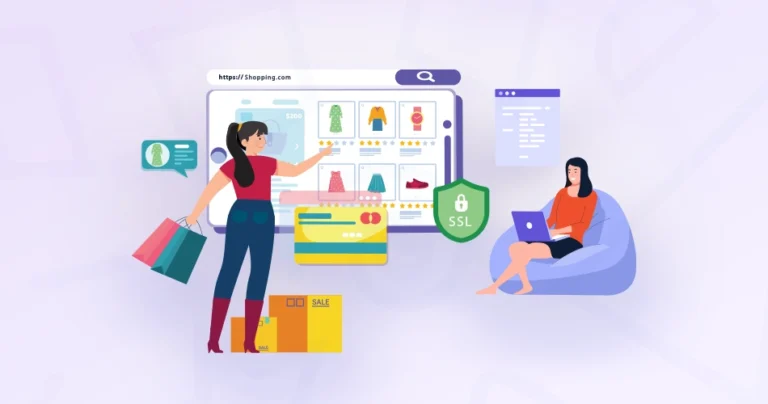As you may already know, eCommerce is one of the biggest highlights of the 21st century, so far. The fact that anyone can order almost anything imaginable from the comfort of their home, and it will be delivered to them, is amazing. If you would have told this to people even 40-50 years ago, they would have had their jaws to the floor.
But, of course, people often have their reservations about shopping online, and rightfully so. We hear about online scams and such, every other day. So how does a business owner tackle this issue? Well, when you create an eCommerce business, one of the most critical things you need to take care of is the security. That’s what we’re going to talk about in this blog.
I’ll tell you all about the importance of eCommerce security and the services implemented by the dedicated eCommerce experts to maintain it. Let’s begin with your key query.
What is the Importance of eCommerce Security?
As the term suggests, eCommerce security is all about protecting an eCommerce website. It refers to the tools and practices used to create a safe environment for both the businesses and their customers. And it ensures safe and reliable transactions over the internet.
Here’s why eCommerce security is important:
- Protects sensitive data: eCommerce transactions involve sensitive information like credit card details and personal addresses. Strong security safeguards this data from hackers and cybercriminals who might use it for fraudulent purposes.
- Maintains customer trust: Customers are understandably wary of sharing their information online. Robust security measures show customers their information is protected, fostering trust and loyalty. Insecurity scares customers away and damages a business’s reputation.
- Reduces financial losses: Data breaches can be incredibly expensive for businesses. That leads to financial losses, legal repercussions, and harm to brand reputation. eCommerce security helps prevent these costly situations.
- Ensures business continuity: Cyberattacks can cripple an online store’s operations. Security measures help businesses stay operational and minimize downtime caused by malicious attacks.
Overall, eCommerce security is essential for building trust and protecting sensitive data. Consequently, it ensures a smooth online shopping experience for everyone involved.
What are the Core Principles of eCommerce Security?
At its core, eCommerce security entails principles that are pretty easy to remember, thanks to the acronym CIA. That means Confidentiality, Integrity, and Authentication. And there is an additional principle called Non-repudiation, for a more robust system. These principles ensure the safety and trustworthiness of online transactions.
Let’s take a look at the core principles of eCommerce security:
Confidentiality
This principle focuses on protecting sensitive customer data like credit card details, addresses, and purchase history. Encryption is the key here, scrambling data into an unreadable format during transmission and storage. Only authorized users should be able to access this information.
Integrity
Having an eCommerce website with integrity means the information will be safe from being altered or tampered with during the transaction process. So the hackers can’t change order details (like quantities or prices) or product info (like descriptions or specifications).
Authentication
Authentication verifies the legitimacy of users trying to access the eCommerce platform. This security principle incorporates strong login procedures with measures like complex passwords and multi-factor authentication (MFA). They make sure only authorized users can access accounts and make transactions.
Non-repudiation
This principle ensures that a transaction cannot be denied by either the customer or the business. Secure transaction records with digital signatures help establish a clear and undeniable record of a purchase. That is important for resolving disputes and preventing fraud.
These four principles create a foundation upon which you can secure your eCommerce website. With them, you can build trust with your customers and protect their sensitive data for a smooth and secure shopping experience.
So how do the eCommerce development services ensure security for an eStore? And what kind of issues do they take care of? Let’s discuss them in the further sections.
What are the Best Practices for eCommerce security?
The above sections might have helped you understand the importance of eCommerce security and the core principles that control it. So now, let’s take a look at the best practices implemented to ensure the security:
Secure Hosting
Choose a reputable web hosting provider that offers features like automatic software updates, firewalls, and intrusion detection systems to safeguard your store’s infrastructure.
Secure Platform
Select an eCommerce platform with built-in security features like user permission controls, secure logins, and regular security updates. Popular platforms prioritize security and stay updated on the latest threats.
SSL/TLS Certificates
Ensure your store has a valid SSL/TLS certificate. This encrypts data transmission between your store and customer browsers, protecting sensitive information like credit card details. Look for the “https://” prefix and a padlock symbol in the address bar to verify a secure connection.
Payment Gateways
Integrate a payment gateway that can handle all credit card transactions securely. Payment gateways are specialists in secure financial transactions and are compliant with Payment Card Industry Data Security Standard (PCI DSS). Never store full credit card information on your servers.
Strong Passwords
Enforce strong password policies for both customer accounts and admin dashboards. Encourage complex passwords with a mix of uppercase and lowercase letters, numbers, and symbols. Consider password managers for complex password generation and storage.
Data Backups
Create regular backups of your store’s data, including customer information and product details. Store backups securely off-site and ensure easy restoration in case of a cyberattack.
Multi-factor Authentication (MFA)
Implement MFA for admin logins and consider offering it as an option for customer accounts. MFA adds an extra layer of security beyond usernames and passwords.
Data Access Control
Grant access to sensitive data only to authorized personnel who absolutely need it. The principle of least privilege helps minimize the potential damage from a security breach.
Security Plugins
Many eCommerce platforms offer security plugins that can add features like firewalls, malware scanners, and fraud detection tools. Explore these options to enhance your security posture.
PCI DSS Compliance
PCI DSS compliance is mandatory for businesses that handle credit card information. And it’s a good security benchmark to follow even if you don’t process credit cards directly. Following these standards demonstrates a commitment to secure customer data.
Remember, eCommerce security is an ongoing process, and reliable eCommerce website maintenance services play a key role in keeping your store protected through continuous monitoring, updates, and vulnerability management.
How to Maintain eCommerce Security?
As I said, eCommerce security is an ongoing process. It requires constant vigilance and adaptation. Here are some key strategies to keep your store secure:
Regular Backups
Create regular backups of your store’s data, including customer information and product details. Store backups securely off-site, following the 3-2-1 backup rule (3 copies, 2 different media, 1 off-site location). This ensures data recovery in case of a cyberattack or hardware failure.
Software Updates
Make updating your eCommerce platform, plugins, and all third-party integrations a top priority. These updates often include security patches that address newly discovered vulnerabilities. Schedule automatic updates whenever possible to avoid delays.
Vulnerability Scans
Conduct regular vulnerability scans to identify weaknesses in your store’s security posture. These scans can be automated or manual, and penetration testing by a security professional can simulate real-world attacks to uncover deeper issues.
Web Hosting Security
Ensure your web hosting provider offers ongoing security measures. Look for features like automatic OS updates, intrusion detection systems, and web application firewalls to continuously safeguard your store’s infrastructure.
Security Information and Event Management (SIEM)
Implement SIEM tools to collect and analyze data from various security sources like firewalls, intrusion detection systems, and access logs. This centralized monitoring allows you to identify suspicious activity and potential threats.
Transaction Monitoring
Keep an eye on transaction logs for anomalies that might indicate fraudulent activity. Tools can help analyze purchase patterns and flag suspicious behavior like unusual purchase locations or excessive order quantities. Additionally, it’s important to manage unwanted bot activity. Here’s how to prevent bot traffic in your eCommerce store.
Customer Login Attempts
Monitor login attempts, especially for admin accounts. Implementing lockout policies after a certain number of failed attempts can deter brute-force attacks.
Data Encryption
Consider encrypting sensitive data at rest and in transit, adding an extra layer of security. This makes stolen data unreadable for unauthorized users.
Secure Password Management
Enforce strong password policies and consider password managers for complex password generation and storage for both customer accounts and staff logins. Educate staff on proper password hygiene and avoiding password reuse.
Staff Training
Regularly train your staff on cybersecurity best practices. Train them to identify suspicious activity, phishing attempts, and social engineering tactics. Emphasize the importance of reporting any security concerns immediately.
Customer Education
Educate your customers about online security measures they can take to protect themselves. Share tips for creating strong passwords, recognizing phishing emails, and secure online shopping practices.
Compliance with Regulations
Stay updated on relevant data privacy regulations like PCI DSS and GDPR. Following these regulations demonstrates your commitment to securing customer data and helps maintain trust.
Remember, consistent effort and adaptation are key to tackling the latest security threats. So we suggest you opt for the eStore site maintenance services offered by our eCommerce website development company. They will constantly monitor your website and make sure everything is as it should be.
Conclusion
The need for eCommerce security is unmissable. As more companies go online, it’s essential to protect customers’ sensitive info. Cyber threats are forever changing, so businesses must stay ahead. Without it, your store may be vulnerable to data breaches, identity thefts, financial frauds, etc.
So you need to use measures like SSL certificates, robust user authentication processes, secure payment gateways, regularly updating and patching software, and more. And don’t forget the core principles of eCommerce security: Confidentiality, Integrity, Authentication, and Non-repudiation. Do you need help with eCommerce security for your eStore? Then let’s have a consultation today!
FAQs on Importance of eCommerce Security
Q1. Is encryption important for eCommerce security?
Encryption plays a vital role in eCommerce security by encoding sensitive information such as credit card details, passwords, and personal data. This ensures that only authorized parties can access and decipher the information, protecting it from potential threats.
Q2. Are there any legal regulations or standards for eCommerce security?
Yes, there are various legal regulations and industry standards for eCommerce security, such as the Payment Card Industry Data Security Standard (PCI DSS). It is essential for businesses to adhere to these regulations to protect customer data and avoid penalties or legal issues.
Q3. What kind of risk will my eStore be under without proper security?
Without proper eCommerce security, there is a high risk of data breaches, identity theft, financial fraud, and unauthorized access to customer accounts. That may result in a loss of customer trust and damage to brand reputation.

